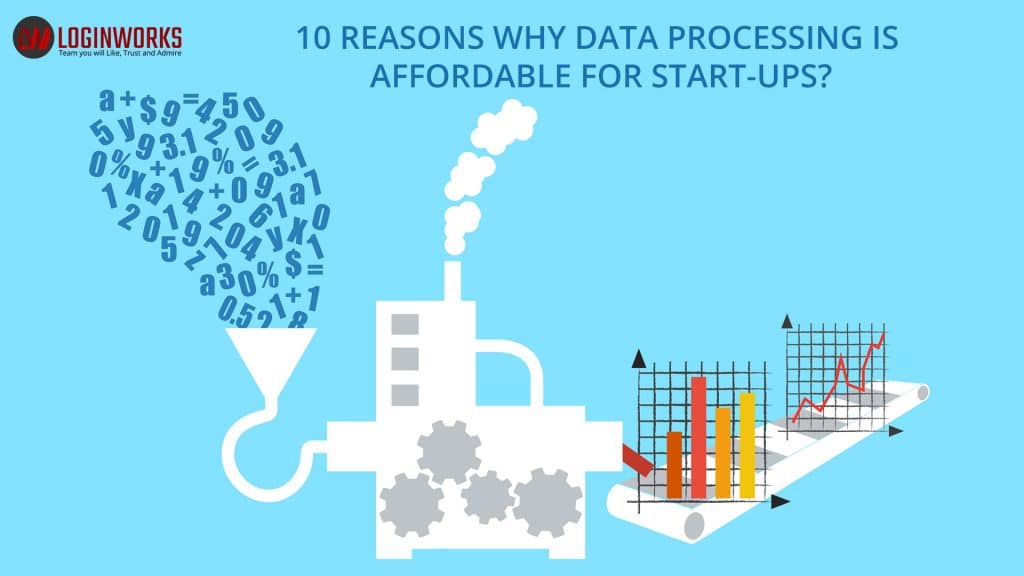Data processing provides key research and management functions that can distinguish a start-up from the crowd. Around 80% of start-ups fail in the first 18 months. Those that don’t fail are usually the ones that start with proper research and good methods of handling information, that is, good data processes.
While it may seem difficult to invest in data processing before you have established profits, it’s not only affordable, it’s almost essential if you are serious about your business.
Let’s look at the reasons why data processing is affordable.
Jump to Section
1. Data-driven Decisions Have a Better Chance of Success
Only with effective information can we make effective decisions. Making informed decisions is what determines the success of a new company. Data processing can help solve questions like:
- What products are performing best and when;
- When to reorder, manufacture, or employ to ensure you are prepared for demands;
- Which channels are driving the most sales.
- What areas are causing losses.
When business and production decisions are based on data, profits are more likely to increase, which makes data processing affordable.
2. Staying Ahead of the Competition
Without data processing on your market, you can’t stay ahead of your competition. The competitive analysis may include consumer market tracking, comparison of competitors’ ratings and market share, or in-depth analysis of comparable products.
Effective monitoring of competition allows for better pricing and marketing strategies. Investing in data processing for competition analysis is affordable since it will help increase market share, generating a return on investment.
3. Better Products Require Data
Without collecting and processing data, we don’t know if our products are actually working or not. Data processing for products in a start-up should in fact start at the design stage before you have even started the venture.
If we don’t have effective product data, our products have a high chance of failure, as does our start-up. Not investing in data-processing for product lines is like playing a game of Russian roulette with your business. Product selection and design need to be data-driven for success.
4. Data Processing Ensures You Meet Customer’s Needs
Fulfilling customers’ needs requires data processing. If we don’t know where, when, and how our customers are buying, what their interests are, or what their spending habits are, we’re operating blindfolded.
Likewise, if we don’t capture customer feedback we don’t know how we can meet customer needs. We cannot determine if customer service is effective, nor where to improve. Not getting to know our customers can result in poor customer retention which is extremely costly for a new company.
Getting to know customers through data analysis ensures a better-targeted customer service. Happier customers will return more often, driving profits.
Customer behavior analysis can also help create more effective marketing campaigns, and provide a measure of their success.
An example of customer behavior analysis in start-ups can be seen in how Netflix grew its DVD business. Netflix processed subscriber usage and recommendation data to tailor packages to suit demand. Data analysis helped them predict consumer demand for online streaming. When they introduced streaming to their business, the company now had a whole host of new metrics with which to tweak and tune. Knowing exactly what customers were watching and how they did it allowed them to predict viewing success, which grew their market share. Customer data processing is affordable since it drives service improvements.
5. Data Processing Helps Build a Better Team
Those that have been successful throughout business history agree that the key is surrounding yourself with good people. Start-ups need a good team. To develop a good team, data processing is needed. Investing in some data research for human resources can save thousands. On-boarding people that later leave or don’t work out is not only an expensive exercise in terms of training and salaries, but it also costs you in profits that are not made by poorly performing staff.
Data analysis can not only provide insights into employee performance but also predict which type of employees prove to be more productive in certain roles. Experience alone is not always a predictor of success, and data can tell us which personal strengths suit what types of roles.
Analyzing employees strengths before employment through data-driven processes such as personality tests, and matching these to employment needs helps improve success.
Building a better team means better talent in all areas for a more successful business, which means data processing of human resources is an affordable strategy.
6. Driving Performance and Adopting Best Practices
Data processing helps to drive performance in company processes. Access to accurate data helps employees do their job better, driving employee empowerment and motivating productivity. Access to data for managers helps them determine if employees are being productive, to identify training needs. Data also helps managers address quality improvements and adequately plan resources.
Data processing can help track safety and quality trends. Review of processes with statistical data can drive the adoption of best practices for improved safety and quality.
Increasing performance and quality reduces costs and increases sales making data processing affordable.
7. Investing in Data Processing Saves Time, Increases Transparency, and Increases Scalability
Automating tasks with data processing means managers and employees save time, owners or investors are aware of business figures, and it’s easy to scale up with increased demand.
If you are not using data processing to evaluate your companies’ figures, then it’s likely you are resorting to manipulating data manually on a spreadsheet. This can take considerable resources from key staff members, contributing significantly to costs, and reducing operational efficiency.
Manual performance comparisons are so time-consuming that some companies skip them altogether, concentrating on new business, but wondering why profits are down. It’s very difficult to evaluate a business without good data processing, and profitability problems, unpaid debts, or fraud can go unnoticed.
If routine tasks like billing, payroll, and reporting are not automated, a company may be throttled against any significant or sudden growth, operations will simply not be able to scale up effectively. Automating routine tasks can allow a small business to run a large operation, reducing time and maintaining better control of operations.
Automation of routine processes, billing, and reports through data processing is an affordable step since it contributes directly to improved operational performance.
8. Identifying and Testing New Business Areas
Data processing can help a business identify new business trends and areas in which to develop expertise. Proper data processing can help test new business models prior to investing large amounts in them.
In deciding on a new branch, data processing can help identify trends in consumer spending and current services provided to determine if demand is sufficient, and which areas will work best.
A review of consumer feedback data can help identify a gap in service or products which the company can fill for additional revenue. Data-driven industry comparisons can help identify trends that promote the success of a new business direction ahead of mass adoption.
A start-up needs to identify areas for business growth to succeed, so data processing is a very affordable means to initiate growth.
9. Data Processing Isn’t That Expensive
The amount of available data management systems has expanded dramatically with increasing data-driven business, meaning that there are many options for data processing which are not that expensive.
Outsourcing is usually cheaper when in the building stage, and can provide very cost-effective solutions on-demand without significant capital expenditure. When outsourcing data, cost-saving tips can be applied such as moving data tasks around higher-paying clients if data doesn’t need to be processed immediately.
Open-source data tools are freely available and can be set up for only a small investment with no ongoing licensing costs.
Many survey tools like Survey Monkey are free to implement, where lots of free structured data about your customers or employees can be gained.
Digital metrics are freely available and already processed in tools like Google Analytics and Google Trends.
There is a great deal of information available from government sources online free, which can be integrated into data processing.
Leverage what you have already, many data applications can be integrated into what you currently have, data processing does not need to start with investing into huge infrastructure, but do start investing into data methods, then those that are successful can be grown by using the rewards they provide. Implementing cost-effective data management means it is very affordable for start-ups.
10. Data Systems Can Solve Complex Problems
Many of the difficult business questions need a data-driven system to provide accurate answers. There are questions that are too difficult for manual processing. With data systems in place, businesses can solve complex problems, and help predict problems before they arise.
Complex problems may be a correlation of variables to identify a complicated fault in a manufacturing process, improving service diagnostics from historical data, identifying a pattern for preventative maintenance, or predictively identifying a safety deficiency.
Uber’s use of location data processing to track users and taxi availability solved a unique problem and put them far ahead of their competition. The use of positioning data helped solve customers’ requests quicker, a key to building a better business.
The ability to solve problems using data identifies a start-up as unique in the market, a quality worth paying for.
Summary
Companies not using data are not competing on a level playing field. Working without data is like playing chess against a computer. Only the real gurus win, and even then it’s only a matter of time before the computer gets better.
The success of start-ups depends on how well they use knowledge to improve services. Knowledge requires facts from effective harnessing and use of data. Not using data means you are not operating at your optimum, where it will be hard to gain a competitive edge.
Data processing provides both cost savings by automation of functions such as billing, reporting, payrolls, and it provides increased earnings through market analysis, customer insights, sales comparisons, and many more.
The cost benefits of using data over not using it far outweigh the small investment required to get started. In today’s competitive marketplace, only those with accurate facts and figures will win.
This means data investment is vital for start-ups if they are taking their new venture seriously.
- Business Intelligence Vs Data Analytics: What’s the Difference? - December 10, 2020
- Effective Ways Data Analytics Helps Improve Business Growth - July 28, 2020
- How the Automotive Industry is Benefitting From Web Scraping - July 23, 2020





